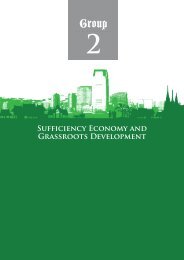Conflict, Legitimacy and Government Reform: Equitable Allocation of ...
Conflict, Legitimacy and Government Reform: Equitable Allocation of ...
Conflict, Legitimacy and Government Reform: Equitable Allocation of ...
Create successful ePaper yourself
Turn your PDF publications into a flip-book with our unique Google optimized e-Paper software.
94 KPI Congress XI<br />
<strong>and</strong> operated, e.g. business corporations. Others may be publicly<br />
owned, e.g. hospitals, schools, government corporations, etc.<br />
Community governance (governance in ‘community space’): this<br />
includes activities at a local level where the organizing body may<br />
not assume a legal form <strong>and</strong> where there may not be a formally<br />
constituted governing board. 6<br />
Family governance where the traditions, culture <strong>and</strong> values within<br />
the family determine how decisions are made, who has voice <strong>and</strong><br />
how family rights, responsibilities <strong>and</strong> resources are allocated.<br />
Drawing heavily on the work <strong>of</strong> the United Nations Development<br />
Program, the Institute On Governance has identified five principles <strong>of</strong><br />
good governance: legitimacy/voice; direction/strategic vision;<br />
performance; accountability; <strong>and</strong> equity\/fairness. 7 Table 1 describes the<br />
5 principles <strong>and</strong> shows the relationship <strong>of</strong> these principles to the UNDP<br />
principles <strong>of</strong> good governance.<br />
Table 1: Principles <strong>of</strong> Good Governance <strong>and</strong> Their Relationship to<br />
the UNDP Principles<br />
The IOG<br />
The UNDP Principles <strong>and</strong> related UNDP text<br />
Governance Principles<br />
1. <strong>Legitimacy</strong> <strong>and</strong> Voice Participation: All men <strong>and</strong> women should have a<br />
voice in decisionmaking, either directly or through<br />
legitimate intermediate institutions that represent<br />
their intention. Such broad participation is built on<br />
freedom <strong>of</strong> association <strong>and</strong> speech, as well as<br />
capacities to participate constructively.<br />
Consensus Orientation: Good governance mediates<br />
differing interests to reach a broad consensus on<br />
what is in the best interest <strong>of</strong> the group <strong>and</strong>, where<br />
possible, on policies <strong>and</strong> procedures.<br />
6 John Graham, Bruce Amos <strong>and</strong> Tim Plumptre, “Principles for Good Governance<br />
in the 21st Century: Policy Brief No. 15”, www.iog.ca/publications<br />
7 Ibid














